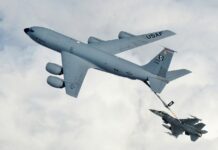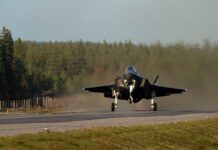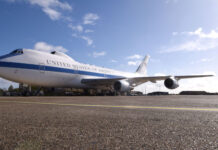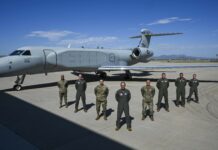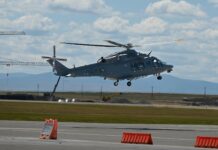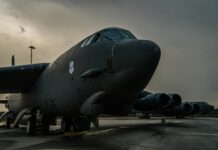The Department of the Air Force (DAF) has opted to continue funding two companies, Anduril and General Atomics Aeronautical Systems Inc (GA-ASI), for detailed design work, manufacture and testing of production-representative test articles under the Collaborative Combat Aircraft (CCA) programme, the US Air Force announced on 24 April 2024.
The programme, part of the Next Generation Air Dominance Family of Systems, is intended to deliver ‘loyal wingman’-type unmanned combat air vehicles (UCAVs) that will work collaboratively with the next generation of US manned combat aircraft.
While Boeing, Lockheed Martin and Northrop Grumman were eliminated from the next stage of the programme, a US Air Force (USAF) press release stated that these companies “will continue to be part of the broader industry partner vendor pool consisting of more than 20 companies to compete for future efforts, including future production contracts”.
“Just over two years ago, we announced our intent, as part of our Operational Imperatives, to pursue collaborative combat aircraft,” said Secretary of the Air Force Frank Kendall in a USAF press release. “Now, following the enactment of the fiscal year 2024 budget, we’re exercising option awards to two companies to construct production representative test articles. The progress we’ve made is a testament to the invaluable collaboration with industry, whose investment alongside the air force has propelled this initiative forward. It’s truly encouraging to witness the rapid execution of this programme.
“We executed an acquisition and funding strategy for CCA with early operator, technologist, acquirer, and industry teaming to quickly iterate requirements given our fielding timelines,” Kendall added. “Continuous competition is a cornerstone at every stage of this programme. The transparency and teamwork between industry and government really accelerated how quickly we could mature the CCA programme.”
The DAF is on track to make a competitive production decision for the first increment of CCA in fiscal year 2026 and field a fully operational capability before the end of the decade. The DAF’s option exercise decision does not exclude any of the vendors from competing for the future Increment 1 production contract.
The DAF is exploring international partnerships, to include potential Foreign Military Sales, as part of the CCA programme. “These partnerships will help provide further affordable mass at scale while driving horizontal integration and interoperability across our international partnerships,” thew air force stated.
In February 2024 GA-ASI successfully conducted the maiden flight of the XQ-67A CCA prototype aircraft, validating the ‘genus/species’ concept pioneered by the Air Force Research Laboratory (AFRL) as part of the Low-Cost Attritable Aircraft Platform Sharing (LCAAPS) programme. This programme focused on building several aircraft variants from a common core chassis. Since then, this prototype for CCA has successfully completed two additional test flights, laying the groundwork for a successful production and flight test programme. GA-ASI’s CCA production-representative design is based upon the XQ-67A Off-Board Sensing Station developed by GA-ASI for the AFRL.
Jason Levin, senior vice president of Anduril’s Air Dominance & Strike Division, was quoted as saying in a company press release on 26 April, “Anduril’s work on this programme is just beginning. US and allied success in the future requires CCAs to be delivered at a speed, cost, and scale to beat the pacing threat. We look forward to continuing our partnership with the US Air Force to deliver this critical capability to our airmen as quickly as possible.”
Meanwhile, planning for CCA Increment 2 development is also ongoing, with initial activities starting later this year. All current and potential future industry partners from the CCA vendor pool will compete for this follow-on effort.
The CCA programme aims to deliver at least 1,000 CCAs, prioritising cost-effective scalability.
“With air superiority pivotal to America’s military dominance for more than 70 years, CCA offers expanded fighter capacity (affordable mass) at reduced costs and adaptable timelines,” the USAF stated.






